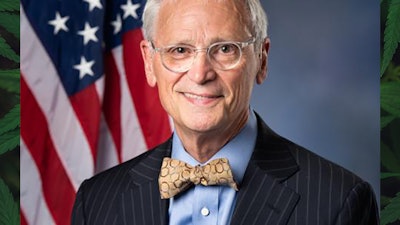
U.S. House Rep. Earl Blumenauer, 75, who has spent his entire political career advocating for cannabis reform, announced Oct. 30 that he will not seek reelection to the U.S. House in 2024.
The bowtie-wearing Democrat was first elected in 1972 to the Oregon House of Representatives and has held public office ever since, including the last 27 years representing Oregon’s 3rd Congressional District in the U.S. House.
During his first term in state politics in 1973, Oregon became the first state in the nation to decriminalize cannabis—reducing the penalty for up to 1 ounce to a $100 fine. From that moment on, Blumenauer became an outspoken supporter for legalization, not just decriminalization.
“I am proud that for more than 50 years I have championed the effort to end the failed war on drugs and decriminalize cannabis,” he said Monday in a statement provided to Cannabis Business Times. “I have helped make cannabis reform a mainstream position in American politics and been involved in every successful state legalization initiative. We have set the stage for the final steps of legalization and racial justice.”
In 2012, Blumenauer formed an alliance with then-Rep. Jared Polis, D-Colo., who is now Colorado’s governor. The two began hosting meetings for congressional staff and advocates to talk about the need for sensible federal cannabis policy.
Blumenauer went on to author a noteworthy report on cannabis, “The Path Forward: Rethinking Federal Marijuana Policy” that served to build a base of bipartisan support in Congress. This was the beginning of the Marijuana Working Group, which by 2017 became the Congressional Cannabis Caucus, which Blumenauer founded with Polis and former Rep. Dana Rohrabacher, R-Calif., and the belated Rep. Don Young, R-Alaska.
The Congressional Cannabis Caucus was established to harmonize federal laws that conflict with state laws allowing for medical and adult-use cannabis. Notably, this caucus was formed to create a bipartisan forum for congressional members to engage, discuss and learned about the need to establish a more rational approach to federal cannabis policy.
This forum also served as a launching pad for transforming cannabis policies during the 116th Congress, when the U.S. House first passed the Secure and Fair Enforcement (SAFE) Banking Act as a standalone measure in 2019 by way of a bipartisan vote, 321-103. This legislation passed the House seven times from 2019 to 2022 but hit roadblocks in the Senate each time.
In a continued effort to ensure state-licensed cannabis businesses can access critical financial services and provide public safety at retail facilities, Blumenauer remains a primary sponsor of the SAFE Banking Act this Congress.
“This legislation will save lives and livelihoods. It is past time that Congress addresses the irrational, unfair, and unsafe prohibition of basic banking services to state-legal cannabis businesses,” he said in April.
Also in during the 116th Congress, the U.S. House passed the Marijuana Opportunity, Reinvestment and Expungement (MORE) Act in December 2020. This is the first and only comprehensive cannabis legalization reform package to have passed either chamber of Congress.
The House passed the MORE Act a second time in 2022, but the Senate failed to act.
In an ongoing effort on this legislation, Blumenauer was one of six primary sponsors to reintroduce the MORE Act in September.
“After 50 years of the failed war on drugs, it is past time for the federal government to catch up with majority of states who have legalized cannabis in some form,” he said last month.
RELATED: US House Democrats Introduce Bill to Federally Legalize Cannabis
Perhaps most notable to date on federal cannabis reform, President Biden signed the Medical Marijuana and Cannabidiol Research Expansion Act in December 2022.
Sponsored by Blumenauer, this legislation facilitates research on cannabis and its potential health benefits. It is the first standalone cannabis bill enacted into federal law since the Controlled Substances Act of 1971.
“After working on the issue of cannabis reform for decades, finally the dam is starting to break,” Blumenauer said last year after sending the bill to Biden’s desk. “The passage of my Medical Marijuana and Cannabidiol Research Expansion Act in the House and Senate represents a historic breakthrough in addressing the federal government’s failed and misguided prohibition of cannabis.”
This Congress, Blumenauer also reached across the aisle to introduce the Veterans Equal Access Act with Rep. Brian Mast, R-Fla., in March. This bill aims to make medical cannabis an option for veterans by requiring the Department of Veterans Affairs (VA) to authorize providers to discuss medical cannabis with veterans and complete forms reflecting their best recommendations.
“I cannot tell you how many times I’ve visited VA clinics and had veterans tell me that medical marijuana saved their life,” Blumenauer said with the introduction. “This legislation is a long overdue step that will benefit millions of our veterans who deserve equal access as their civilian counterparts to state-legal marijuana programs.”
In addition to these efforts, Blumenauer continues to urge the Biden-Harris administration to reschedule cannabis and embrace full cannabis legalization.
After more than 50 years of advocating from public office, Blumenauer said he believes this ultimate goal is within reach.
“I will continue championing common-sense policy and strategizing on federal legislation with advocates, industry and impacted communities,” he said in a statement to CBT.

























